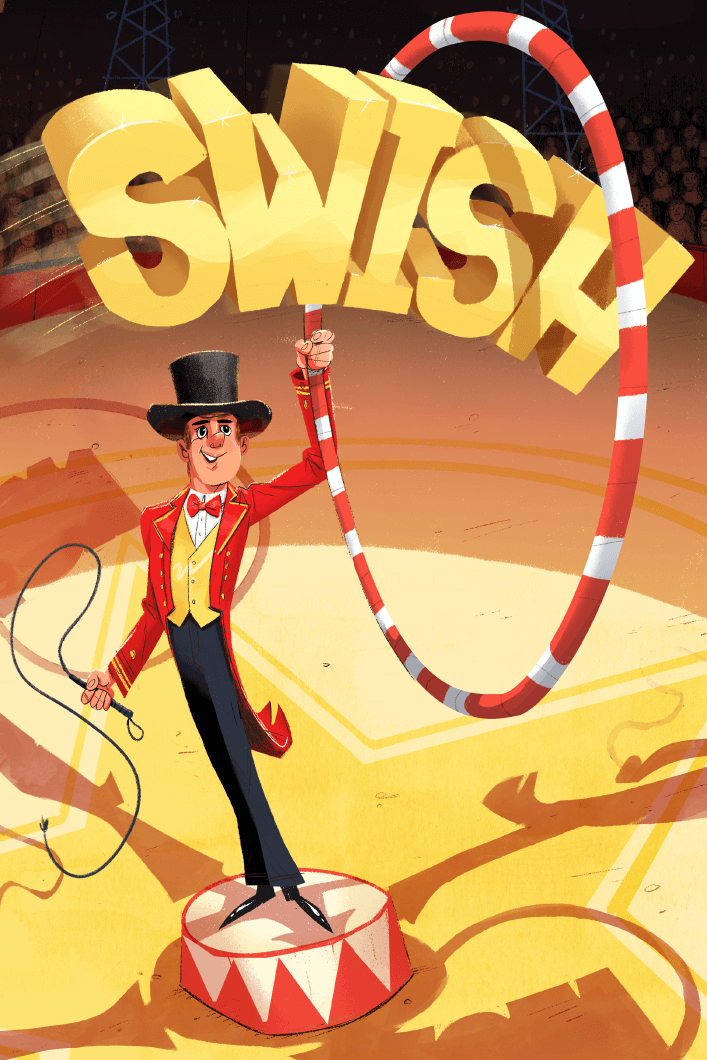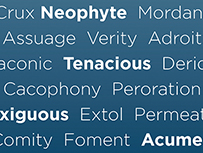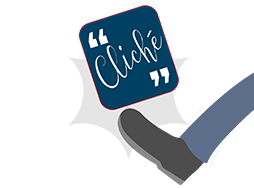 Illustration by Bart Browne
Illustration by Bart BrowneSome speakers leave us spellbound. Besides their compelling messages, these presenters captivate us with their stage presence, their articulate body language or commanding voice. Dazzled by their exceptional skills, we may overlook a fundamental fact. Like a stunning façade hiding the brick work, we may almost forget that the building blocks of those speeches were words. So let’s not take them for granted and instead take a renewed interest in how specific words help or hinder a presentation.
1 Avoid the generic; choose the exact.
Words, let us remember, are not the real thing. Words are codes for objects, actions and feelings. Words are proxies. Take the word hot. How hot is hot depends on whether we are in Montréal or Monaco. The best we can do is to be more exact. Jettison hot. Instead, decide if it is “sweltering heat,” “a steaming cauldron” or scientifically phrased, “42°C, feeling like 46°C.” Each is a lot more exact than hot.
The exact word also saves word count. Imagine that I want to say I empathize with them and realize that the selfie obsession is a function of their demography. Also imagine that, for some reason, I don’t want to use the words empathize, selfie, obsession or demography. With no spot-on synonyms, and each of them taking a sentence to explain, the result is bound to be longwinded like legalese and anything but elegant.
The specific, as against the generic, sends out sharper mental pictures. Martin Luther King did that in his “I Have a Dream” classic, invoking states and their geographies, from the curvaceous slopes of California to the prodigious hilltops of New Hampshire.
2 Recognize and use the auditory personality of words.
Words being words, go beyond logic. Words are like people; they have their own personalities, based on how they sound. Screech, zip and swish are selfies by those respective words. Circumnavigate and prevaricate are aptly long. Go and stop are like crisp army orders. Consonants gang up and the result—especially with r—is abrasive, harsh. Stretch and scratch, for instance. Vowels, especially the long sounds, bring calm and peace. T and I repeated— like in titillate, lilac, Nintendo—mimic string instruments. When we start to recognize and appreciate people for their varying personalities, we get the best out of our relationships with them. So too with words.
3 Metaphors and the famous.
In the middle of your speech, say “Mahatma Gandhi” or “Michael Jackson,” and pause. In their mental screens, audience members will be watching reams of films and audio recordings of these historical figures. You have conveyed so many facts and emotions by dropping just a name. A famous name is a high-density package. Somewhat the same can be said about metaphors.
What does the title “A Ringmaster of Words” mean to you? Do you remember the circus you visited when you were a child? Didn’t you remember the ringmaster wearing a black suit or cloak, or maybe a colorful cap? Just one word—and look at the distant memories and colorful pictures it invokes! Not just that. Then the idea dawns, about the power of words and how that power can be harnessed to special effect, just as the ringmaster gets the animals to dance to his whip.
4 Aim for the flab-free, six-pack of language.
A concept in the field of psychology recommends that on any issue, we first take an instinctive and 100% subjective stand before applying the 100% objectivity filter, for a final view. That principle can work well in writing. After an unhindered, uninhibited outpouring of thoughts, be your own editor. Be a miserly, ruthless editor. Be economical with words. Any word that can be chopped without affecting the intended meaning should go. What remains will be pithy. Brevity is the soul of wit.
Metaphors, through condensed messaging, aid brevity and therefore efficient communication. Famous names do the same, being zip files of multiple mental pictures.
A flab-free passage has the finesse and attraction of a chiselled muscular body with not an ounce to shed.
5 Avoid clichés, create originals.
If invited to a party, would we borrow a friend’s colorful but fading clothes, or go dressed in our own? Surely we prefer our own fresh clothes, however modest they may be. Then, on stage to make a speech, why should we borrow faded clichés when we can find fresh expressions to relay our thoughts?
“Words are like people, they have their own personalities.”
Every prospective writer and speaker can benefit from this advice. English satirist Jonathan Swift warned against using familiar, which “have lost all evocative power and are merely used because they save people the trouble of inventing phrases for themselves.”
In sum:
- Favor exactitude and specifics, rather than approximations and generalizations
- Recognize and treat words as you treat people
- Metaphors and famous names offer high-density communication packages
- Elevate the writing to the flab-free, six-pack state
- Avoid the expected; instead, innovate
Be it music, gymnastics or surgery, true mastery is accompanied by a certain fearlessness—both feed on each other. That is how the ringmaster at the circus controls his show. That fearlessness and confidence bridges the obvious strength deficit.
Become a ringmaster with words. Be fearless with them. Get them to display their tricks and receive with a gracious bow all the applause!
Thomas T. Abraham is a member of Medley Toastmasters club in Chennai, India. A former corporate communicator, he was Public Relations Manager in District 82 for 2018–2019.



 Previous
Previous
 Previous Article
Previous Article

